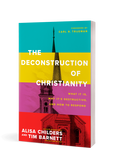|
This article is in response to this piece from The Gospel Coalition. As a past TGC contributor, as an act of good faith, I did express my concerns directly to TGC before posting my article here.
**Update** The Gospel Coalition was gracious to publish a condensed version of my article on their site. No, Martin Luther Was Not a Deconstructionist. And neither was Jesus. Many years ago, my Christian beliefs were challenged intellectually by a progressive Christian pastor. It threw me into deconstruction that took several years to fully come out of. I would find out later that he himself had already deconstructed and had hoped to propel his congregation into deconstruction so he could convert them to progressive Christianity. He was very good at it. In fact, he was almost totally successful. A few of us came back around to a historically Christian understanding of the gospel, but most did not. Because of this, when “deconstruction stories” started popping up in my social media newsfeed, along with hashtags like #exvangelical and #deconstruction, I paid attention. I’ve been following along… seeking to understand what people mean by those words. I witnessed a hashtag turn into a movement. As of today, there are 293,026 posts on Instagram utilizing the hashtag #deconstruction. The vast majority are from people who have either deconverted from Christianity, become progressive Christians, embraced same-sex marriage and relationships, rejected core historic doctrines of the faith,and/or are on a mission to crush the white Christian patriarchy. There are a few photos of deconstructed clothing (apparently this is a thing?) and a scant few sneaky posts from evangelicals attempting (mostly unsuccessfully) to convince the deconstructors that Jesus is the way. A plethora of insults, mockery, and anger are hurled at the church, along with memes stating, “I regret saving myself for marriage,” and “Good morning! It’s a great day to leave your nonaffirming church.” Online, there are countless deconstruction therapy and counseling sites which will facilitate your deconstruction and reconstruct you with mindfulness or the contemplative practices of progressive Christian favorites like Richard Rohr. There are conferences you can attend, one for which I personally paid good money (for research purposes) to be taught how to break free from toxic religion, reject Christian dogma, and learn to embrace what basically added up to warmed-over Buddhism. Phil Drysdale, a deconstructed Christian and deconstruction researcher asked people on Instagram to name the accounts that have helped them through their deconstructions. A quick scroll reveals that the leaders and guides the vast majority are looking to are accounts/people like Lisa Gungor, Audrey Assad, God is Grey, Jesus Unfollower, Your Favorite Heretics, Jo Luehmann, The Naked Pastor, and a plethora of others dedicated to providing a space for Christians to examine, reinterpret and/or abandon their beliefs. None of these accounts are encouraging Christians to look to Scripture as the authority for truth. My Kingdom for a Definition In my book, Another Gospel: A Lifelong Christian Seeks Truth in Response to Progressive Christianity, which chronicles my own deconstruction journey, I define deconstruction this way: In the context of faith, deconstruction is the process of systematically dissecting and often rejecting the beliefs you grew up with. Sometimes the Christian will deconstruct all the way into atheism. Some remain there, but others experience a reconstruction. But the type of faith they end up embracing almost never resembles the Christianity they formerly knew. I would add that it rarely retains any vestiges of actual Christianity. Over the past year or so, it has become common for Christian leaders to begin to refer to deconstruction as something potentially positive. I get it. When I first heard that take, I thought, “Hmmm. That could work. Just deconstruct the false beliefs and line up what you believe with Scripture.” I was operating from the foundational belief that objective truth exists and can be known. But as I continued to study the movement, this understanding of deconstruction became untenable. That’s because the way the word is most often used in the deconstruction movement has little to do with objective truth, and everything to do with tearing down whatever doctrine someone believes is morally wrong. Take, for example, Melissa Stewart, a former Christian now agnostic/atheist with a TikTok following of over 200k. She describes how lonely and isolated she felt during her own deconstruction, and how discovering the #exvangelical hashtag opened up a whole new world of voices who related with what she was going through. Her TikTok platform now gives her the opportunity to create that type of space for others. In an interview on the Exvangelical Podcast, she commented on the deconstruction/exvangelical online space: My biggest experiences with it were people talking about what they went through—their stories—and it was very personal and it focused on the human beings who have come out of this, rather than on whether a certain kind of theology is right or wrong. In my experience studying this movement, I think she nails it on the head. Deconstruction is not about getting your theology right. It’s built upon a postmodern-ish embrace of moral relativism. For example, if your church says a woman can’t be a pastor, the virtuous thing to do would be to leave that church and deconstruct out of that toxic and oppressive doctrine. Deconstructionists do not regard Scripture as being the final authority for morality and theology—they appeal primarily to science, culture, psychology, sociology, and history. A Life of Its Own Now, the narrative is evolving. I’m seeing more and more posts, including the previously mentioned Gospel Coalition article, that portray Martin Luther and even Jesus himself as deconstructionists. This, in my view, is inherently irresponsible. If deconstruction means nothing more than changing your mind, or correcting bad ideas, then I can say I deconstructed by switching from AT&T to Verizon. Martin Luther was trying to reform the church to get back to Scripture. This is most certainly not what the deconstructionists are doing. In most cases, the Bible is the first thing to go. And when people put Jesus in the deconstruction camp…it’s unclear whether they mean he deconstructed his own views or he deconstructed the views of others. Either way, it's seriously problematic. Deconstruction is not an appropriate term to use in these contexts. It’s as if all of the sudden no one knows what the word means anymore, and they are somehow trying to redeem it or co-opt it to represent something like changing your mind or reforming your faith. Some in the deconstruction movement will argue that the current iteration of deconstruction is not to be conflated with the postmodern philosophy of Jacque Derrida, who is often referred to as the “Father of Deconstruction.” But I’m not convinced. Ultimately, Derrida didn’t believe that words could be pinned down to singular meanings. James Lindsay and Helen Pluckrose put it like this: “For Derrida, the speaker’s meaning has no more authority than the hearer’s interpretation and thus intention cannot outweigh impact.”[i] Of course, for Derrida deconstruction had to do with text and words, not necessarily the dismantling of one’s faith. But it’s only a short jump from deconstructing the text of the Bible (which, I would argue, is typically the first stop on the path to deconstruction as it is manifesting today) to the complete unraveling of one’s orthodox Christian beliefs. Here’s the irony. If we attempt to completely detach current deconstruction from Derrida and define it subjectively, we are literally deconstructing the word “deconstruction” a la Derrida. Why are we trying to co-opt a word and spin it into a positive? And if the meaning of the word deconstruction signifies any number of different things, at best we will be equivocating. At worst, we will have bought into the assumptions of postmodernism hook, line and sinker. Matt Chandler is Right Recent comments by Matt Chandler have made the rounds in which he characterized deconstruction as “the sexy thing to do,” hitting on the almost trendy type of cool factor the word now carries. Aside from giving the deconstructionists endless opportunities to make him the butt of their “Matt Chandler thinks I’m sexy!” jokes and memes, his comments (along with the recent comments by John Cooper of Skillet) have revealed that many Christians are using this one word in profoundly different ways. For example, Relevant magazine claims Chandler and Cooper have a “fundamental misunderstanding” of deconstruction. I disagree. I admit I’ve had a few quibbles with points Matt Chandler has made in recent years. But on this I think he understands something they don’t. He links deconstruction with the postmodernism of Derrida, and in a subsequent Instagram post, commented, “Deconstruction doesn’t mean doubt or theological wrestle or struggling through church hurt.” (All things he said he’s been through and has tons of mercy for.) I think he’s dead right. We are Christians, and we should be deriving our vocabulary and categories from Scripture. I see nowhere in the Bible where anything like the current movement of deconstruction is promoted or condoned. I propose we leave it with Derrida and instead use biblical words and categories like doubt, reformation, discernment, and even sometimes, (gasp!) apostasy. Let’s save deconstruction for what it presents itself to be. Here are some characteristics to look for if you think you might be deconstructing: 1. Some type of moral relativism is assumed, whether explicitly or implicitly. If Scripture is your authority, you are not deconstructing. That doesn’t mean you’re not struggling deeply with doubt, seeking healing from church abuse, or have profound confusion over what it means to be a Christian. 2. You are detaching from the body of Christ and seeking only the community of others who are also in deconstruction. If you are working through your doubts and questions in community with other believers, or at least have the intention of doing so, you are not deconstructing. Sometimes this will mean leaving an unbiblical church environment for a time, with the goal of finding a healthy one. 3. You are looking to non-Christian religious philosophies, history, or sociology—rather than Scripture— to determine authentic Christianity. Not that things like history and sociology are without merit, but if you are honestly seeking to derive your religious beliefs from Scripture, you are not deconstructing. This doesn’t mean there’s no hope if you find yourself in actual deconstruction. Ten years ago, I found myself spiraling into deconstruction, and God in his unfathomable mercy and faithfulness led me out. Let’s not Deconstruct Deconstruction As Christians, we tend to protest when progressives and secularists take words and phrases like “love,” “tolerance,’ “biblical inspiration,” and “incarnation” and change the definitions to suit their preferences. Let’s not do the same with deconstruction. Deconstruction has taken on a life of its own, and now is the time to be extremely careful to define our words accurately. After all, if the word means everything, then it means nothing, yet it carries the potential to suck unsuspecting Christians into a very dangerous vortex of ideas from which they might not return.
54 Comments
Barry Poudrier
2/15/2022 07:50:28 pm
Hello Alisa,
Reply
Dawn Larson
2/16/2022 01:33:48 am
Thank you for this article. It is timely for me since I just had someone share that tweet with me about Jesus being a deconstructionist. I had never heard that before and now I understand better what's going on. So sad for people I know who have abandoned God's Word for books like "Jesus and John Wayne."
Reply
Gloria Pope
2/28/2022 08:40:38 am
Hi, Dawn. I read Jesus and John Wayne. I did not abandon God's Word, I abandoned, Mark Discoll, James Dobson, Tim LaHaye, Bill Hybels, Billy Graham.... and on and on.
Reply
Caroline
2/16/2022 02:18:12 am
So good!
Reply
Kristin McGuire
2/16/2022 11:37:25 am
Thank you for this constructive evaluation of deconstruction. I am not seeing a lot of good fruit from the latter, so I think I will stick with my unsexy theology.
Reply
Krissy
2/16/2022 11:59:33 am
It seems like in an age of deconstructionism one of the most powerful things they can deconstruct/take apart is language. Which also makes the ambiguity in defining it a strength for them. I'm teaching a class to middle and high school students on rhetoric, worldview, and the media, and I started by covering rhetoric, and used a recommend book by Daniel R. Berger "Speaking the Truth in Love, Christian Public Rhetoric.” In Chapter 1 Berger brings up Derrida as well, and goes into deconstructionism from a rhetoric and linguistic view and it is fascinating, starting with "that's your truth" and breaking it down more, and then gives a worth-reading summary of Deconstructive Linguistic Philosophy and why he rejects it. And this was published in 2007!
Reply
Nadine Youssef
2/21/2022 03:29:11 am
Exactly.
Reply
Mary Lou McDonough
2/16/2022 12:22:41 pm
Thank you so much for your dedication 2 biblical truth. I think your perspective has considerable weight due to your own experience with deconstruction errors. It also seems to me that there is a satanic Spirit of Seduction attached to this movement.
Reply
John Evans
2/18/2022 02:49:07 pm
Well, Mary, the movement that is defending and hiding pedophiles and abusers sure isn't the deconstructing movement, so are you sure about that whole Satanic Spirit thing?
Reply
Gordon Hackman
7/29/2022 01:46:19 pm
This is nothing but whataboutism.
Gordon Holley
8/2/2022 11:16:40 pm
Are you saying that severely questioning a sacred institution is the moral equivalent to the aiding-and-abetting of pedophilia that that said institution facilitates by its vulnerabilities and misprision?
Kyle
2/17/2022 07:52:52 pm
Some thoughts on deconstruction.
Reply
John Evans
2/18/2022 02:21:04 pm
Amen Kyle!
Reply
Noah
2/18/2022 03:19:31 pm
Hi Kyle,
Reply
Noah
2/19/2022 02:42:57 pm
Kyle, I agree! I used to be very into the apologetics movement, hoping to grow up to be a great apologist. But everything you are saying is ringing so deep and true in me, and the journey I've been on. Christ is Lord, I believe that wholeheartedly! But much else I'm realizing is up in the air, and that's okay. But spot on to everything you said.
Reply
Anthony Barber
3/19/2022 10:40:34 am
Point well taken. After all Jesus said to remember the beam in our own eyes before we can se clearly to take the splinter out of someone else's eye. Having said that, the ultimate issue for a Christian is..what says the Lord? And yes too often we get the Kingdom of God mixed up with the politics of men, and with American culture. Deconstructing can be good if you are getting rid of values and doctrines that really don't come from Scripture, but it can be very distructive when you abandon or distort essentials of the Christian faith. We are called to believe certian things. Test the spirits, cling to what is good. 1 John 4:1.
Reply
Jeannie Prinsen
2/18/2022 10:16:04 am
You spoke about progressive Christianity at our church in Ontario 2 years ago and it was the impetus for many people leaving our church. The fear mongering, decontextualized quoting from progressive writers, and poor analysis of gospel "vs" justice were appalling.
Reply
Gordon Hackman
4/27/2022 01:29:53 pm
The progressive writers won't get any better if they're "contextualized."
Reply
Christopher
2/18/2022 10:26:30 am
Brilliant article, which I picked up through the TGC website. Being an Evangelical from the UK rather than the USA, I wonder how much deconstruction comes from the toxic marriage between right-wing politics and much of American Evangelical Christianity? If being Evangelical is voting for Trump, many Gen Z people (the age-group I teach) would want nothing to do with it. Not everyone reads real Evangelicals like Russell Moore to know that the two things are quite separate. Of course lots of it is moral too - teenagers rejecting Christian sexual morality - but to an Evangelical from Britain the culture war and the decision by so many "Evangelicals" to put politics above Scripture (love your neighbour anyone???) is responsible for much of this tragic mess.
Reply
Sam
2/18/2022 12:20:19 pm
Good post on an interesting subject. Perhaps in the days before social media this topic wouldn't or couldn't have had such an impact or far reaching consequence. What I'm seeing with this is that for an immature Christian this is a very, very dangerous topic or approach for one's faith. I don't feel that's getting much attention unfortunately. Many in this movement don't have an understanding of what they're deconstructing in the first place and that's what should be bothersome. They're being blown around from one wind of doctrine to another without, I think, understanding what either one is. That is what is so irresponsible about this to me: in the way that deconstruction passes through various social media. You have no idea who's reading it or why on instragram, facebook, youtube, twitter or whatever else.
Reply
John Evans
2/18/2022 02:19:08 pm
Alisa,
Reply
Rick
2/26/2022 04:30:42 pm
John,
Reply
DH
3/3/2022 11:56:19 am
Rick, so well put. I've heard many stories of folks throwing out the baby with the bathwater - describing the deconstruction of their beliefs that never really resembled Christianity in the first place. I went through this myself. I also went through a period of time where when I rejected truth because it didn't align with my own sense of morality. Finally, I realized it's not about me - it's about God. And it came to the point where I had to decide - was I going to live my life according to my own warped viewpoints, or was I going to surrender my will and life to a holy, just, loving, good God? It honestly felt like no kind of choice - I'm old enough to have experienced the consequences of my rebellion, so surrendering and trusting this good God seems the only sensible option.
Anthony Barber
3/19/2022 11:05:03 am
What do you underestand evangelical theology to be saying and why do you think it is not equal to Biblical theology?
Reply
Gordon Holley
3/21/2022 10:33:18 am
You judge a tree by its fruits, not by its instruction manuals. The secret to unlocking the Bible is reading it as though it were to be read by 1st Century Jews in Jewish Koine from the Aramaic, not by 1800s Englishmen.
Adam Brunson
2/18/2022 05:09:29 pm
Thank you. Very helpful.
Reply
Bob Jones
2/19/2022 08:24:17 am
You said, "I would add that it rarely retains any vestiges of actual Christianity. ". This is wrong.
Reply
J Smith
2/25/2022 09:59:46 pm
Well said!
Reply
anthony barber
3/19/2022 11:14:55 am
May I say that the Evangelical church has strayed from the Word in many ways, but I must disagree on your staement that being thrown into (or not) hell is based on feeding the hungry and giving them water, etc. That is not the basis of salvation, though it can be and should be the fruit of it. The basis of our salvation is the finished work of Jesus Christ on the Cross alone. And our embrace of that. Having said that, faith without works is dead, as James wrote.
Reply
Nadine Youssef
2/21/2022 03:25:59 am
Brilliant, brilliant, brilliant.
Reply
Regan Wieland
2/21/2022 11:31:37 am
As a life-long christian navigating what I've discovered is called "deconstruction", I'm dismayed to find that so many of my fellow travelers seem to have merely traded their original religious dogma for a new progressive dogma instead of rejecting dogma altogether and embarking on an objective search for The Truth (which must exist if God is really "God").
Reply
Gordon Holley
2/21/2022 03:58:49 pm
"doubt, reformation, discernment"
Reply
Gordon Hackman
4/27/2022 01:33:50 pm
I find this comment completely uncompelling. You stipulate your own definitions of the three words and then assert that we should reject them based on your stipulations. Not sure why anyone should take you seriously.
Reply
Gordon Holley
5/2/2022 08:13:51 pm
The Bible has a lot to say about doubt (Prov.3:5, Matt.14:31; 21:21, Mk. 9:24, Rom 14:23, Jas 1:6-8) and none of it is good. Unwavering conviction is heavily encouraged in scripture.
Gordon Hackman
7/29/2022 01:52:28 pm
I find it uncompelling because you've done nothing to justify your stipulations.
Gordon Holley
8/2/2022 11:01:37 pm
I did do something. I wrote 2 paragraphs justifying my objections about word usage and their frequent associations you can read above and more below: "Doubt" is associated with faithlessness in the Bible, therefore those who read the Bible will be prone to read that into the term. "Discernment" is used in the rhetoric of fundamentalist heresy hunters who attack anyone who doesn't follow their polemic. Many who have crossed paths with their groupthink and hostile community will see "discernment" as more an act of nit-picking and making wild accusations. "Reformation" is associated with the Protestant Reformation and thereby its antimaterialism, splintering, reductionism, and the cold, silent, hateful smugness of the nearest Reformed church, none of which are a fitting image. You can decide not to be convinced, but I made an argument. I don't know why you are so desperate to tell me how important your opinion on my suggestion for better semantics is that you have to insult me by saying my argument is "nothing".
Gordon Holley
8/2/2022 11:22:02 pm
I listed out for you the associations made with the most common usage of those words. I'm not going to do the thinking for you; you can connect the dots on your own. I'm not sure why your opinion is so important that you have to try and insult me by telling me that my arguments are nothing, but I'm not gonna let you goad me any more with your "la la la I can't hear you." Go bully someone else.
Gordon Hackman
8/22/2022 10:39:15 pm
On further rethinking, I'd say that a better term than uncompelling for describing your stipulated definitions would be uncharitable.
Heather
2/22/2022 11:16:08 am
Yes, Luther stood up to the Catholic Church by using the Bible itself to challenge practices that were not in Bible. It seems like it’s reversed for some deconstructionist, they are trying to skirt around what the scripture says based on their own feelings and worldly perspective. They aren't using the Bible as a filter, they use themselves to filter God’s Word.
Reply
2/23/2022 02:45:14 pm
Alissa,
Reply
Gladys
2/24/2022 10:53:36 am
why the fear on people deconstructing? Each person has to walk their own path before God. God is not a tyrant and probably understands why people deconstruct more than the people themselves.
Reply
James
2/24/2022 02:10:46 pm
Great perspective on a complicated topic. I think there are some issues though.
Reply
Daniel
2/25/2022 12:26:45 pm
With respect, I find your assertion of what deconstruction is to be incorrect, and I think the problem begins with the fact that you seem to be assuming that everyone who deconstructs starts out with the "right" theology and deconstructs into something that is objectively "wrong" theology, as evidenced my your assertion that, "If Scripture is your authority, you are not deconstructing." This is simply untrue. Let me explain.
Reply
grimtraveller
2/29/2024 10:30:10 am
Daniel, I agree wholeheartedly.
Reply
James Wartian
2/25/2022 02:59:13 pm
Very well said. I think your call to start with biblical language needs to be repeated over and over. Words do have meaning, and we are not allowed to subjectively make a word mean whatever we want (which you said far more eloquently than I just did). Thank you for your clear yet gracious reply to a confusing article on TCG. Thank you for putting the Bible first. No truly mature Christian would be arrogant enough to think we are 100% right in how we understand the Bible, but if the Bible is not our authority, then we have no where else to learn the words of life!
Reply
Michael
2/27/2022 02:11:25 pm
Alisa,
Reply
Todd Ritzema
3/7/2022 10:27:25 pm
Alisa -
Reply
Gordon Hackman
4/27/2022 01:38:22 pm
Agreed. Calling Luther a deconstructionist is facile and historically inaccurate at best. At worst, it's dishonest and self-serving.
Reply
5/1/2022 03:46:48 pm
Alisa,
Reply
Diane Truitt
5/8/2022 04:30:37 pm
I am puzzled that you write that you have had a "few quibbles" with Matt Chandler. I have attended his church many times but I left when he began ranting about white privilege and implying we white Christians need to repent of our racism. Hardly a quibble, as he has morphed into a Woke pastor promoting cultural Marxism.
Reply
Kat
5/15/2022 02:46:00 pm
Wow... When I read through these comments it kind of feels like no one actually read the article.
Reply
Andrea
8/14/2022 01:45:57 pm
Alisa, I found this specific blog entry by researching "what Christians think of deconstructing." I currently consider myself someone who's deconstructing the conservative Christian bubble that I grew up in. I have a LOT of religious trauma (thanks in large part to the purity movement) and have been in trauma therapy for 5 years. I was a deeply devout Christian who loved God very much. I went to church regularly until I was in my mid-thirties (a few years ago). I tithed 10% of every dollar that I made throughout the majority of my life thus far. Now, I don't know what to believe. I no longer feel connected to God in any way, shape or form, and that breaks my heart. I have prayed and prayed and begged him to show himself like I thought he was doing throughout much of my life. As I dismantle everything I've been taught, the abuse I've endured, the terrible things I've witnessed in various churches and during my time at a Christian college, I have very little hope that I'll connect with any of it ever again. It's not shameful. Your words made it sound like deconstruction is shameful and scary. I'm DEVASTATED to be in the position that I'm in. It's the hardest thing I've ever gone through. The church needs to embrace and not shame people who are questioning everything and who no longer feel like they have any solid ground beneath them. I truly hope that you and other Christians will be gentle and kind to people who no longer know how to believe the things that you believe. And I hope this blog post doesn't scare people away from being their authentic selves, and from asking questions that are necessary for their well-being.
Reply
Kimberly
11/11/2022 01:37:33 am
I am so sorry to read your story. I do have a nagging question and since your comment yet again brought up the issue, I am asking: Why do people keep "blaming" the purity movement/say they have been so damaged by it? Are you rejecting the idea that God designed sex and sexual expressions of affection/physical bonding for a monogamous marriage relationship? I just do not understand why it was so wrong to encourage embracing abstinence/saving one's sexual expressions for their intended place? It is as if people are wishing they had not obeyed God's Word in this matter, and I just do not understand.....why????
Reply
grimtraveller
2/29/2024 10:46:51 am
Kimberley, Your comment will be posted after it is approved.
Leave a Reply. |



 RSS Feed
RSS Feed


